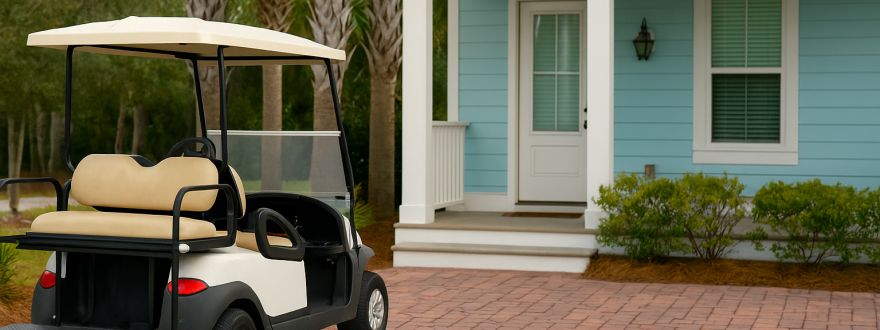
A Hidden Liability on Four Wheels
If you rent out vacation homes along Florida’s Emerald Coast—especially in areas like Destin, Miramar Beach, or 30A—chances are you’ve either considered offering a golf cart to guests or already do. It’s a top-requested amenity that attracts bookings, boosts nightly rates, and gives your property a competitive edge.
But here’s what many rental owners and property managers don’t realize: including a golf cart can create a serious insurance gap that could cost you thousands—or worse.
Golf Carts vs. LSVs: Know the Difference
Before diving into coverage options, it’s important to understand the legal and operational differences between a golf cart and a low-speed vehicle (LSV)—because your insurance and liability depend on it.
Golf Cart:
- Designed for use on golf courses or private communities
- Top speed: Typically under 20 mph
- No title, registration, or insurance required by the State of Florida
- Not legal on public roads, unless local ordinances allow it
Low-Speed Vehicle (LSV):
- Modified or factory-built to go 20–25 mph
- Must have headlights, seatbelts, turn signals, mirrors, and a VIN
- Must be titled, registered, and insured like a regular vehicle
- Street legal on roads with posted speed limits of 35 mph or less
Why it matters:
If you provide a standard golf cart to renters and they drive it on public roads (even briefly), you could face fines, denied claims, or lawsuits—especially if it doesn’t meet LSV safety requirements or isn’t insured correctly.
Are Golf Carts Covered by Homeowners or Auto Insurance?
Not in most cases. Here’s how the standard policies break down:
- Homeowners insurance may offer limited liability for incidents that occur strictly on your property. The moment that golf cart leaves the driveway or HOA path, coverage likely disappears.
- Auto insurance generally doesn’t apply to golf carts—unless they are street-legal LSVs and specifically added to the policy.
- Rental property policies often exclude coverage for vehicles not designed for road use—which includes most golf carts.
The takeaway: If a guest injures someone or causes damage while driving your cart—even within the neighborhood—you could be held personally liable, with no insurance to back you up.
Why This Matters for Vacation Rental Businesses
Golf carts are fun and convenient—but from a liability perspective, they’re a high-risk feature. Here’s why:
- Many renters allow unlicensed or underage individuals to drive them.
- Accidents on roads, sidewalks, or even driveways can lead to property damage, injury, or lawsuits.
- You, as the owner, can be held responsible if the guest doesn’t have golf cart insurance—and most don’t.
Real example:
We’ve seen claims where a guest’s child drove a cart into another vehicle. The result? A $65,000 liability settlement—paid by the homeowner because there was no applicable insurance coverage.
What Kind of Insurance Coverage Do You Need?
To responsibly offer a golf cart with your rental, we recommend:
- Specialty Golf Cart Insurance Policy
- Provides liability, collision, and comprehensive coverage for golf carts.
- Often required if the cart is operated off-property or in public areas.
- Umbrella Liability Policy
- Offers extended protection in case of serious injury or legal claims exceeding your base policy limits.
- Guest Usage Agreement or Waiver
- Have guests acknowledge golf cart rules, liability disclaimers, and driver requirements in writing.
- Keep copies as part of your property’s standard rental agreement.
Florida Golf Cart Laws to Keep in Mind
- Golf carts may be driven on roads with speed limits of 25 mph or less (if allowed by local ordinance).
- No insurance is required by the state for basic golf carts—but that doesn’t protect you as the property owner.
- LSVs must be registered, titled, and insured like cars—with PIP and property damage liability at minimum.
Make sure your cart is compliant with local ordinances, HOA rules, and community restrictions. These vary across Santa Rosa Beach, Seaside, Grayton Beach, and Destin.
Best Practices for Rental Hosts and Property Managers
- Insure the cart separately with a dedicated golf cart or LSV policy.
- Require proof of a valid driver's license from guests who will operate the cart.
- Display operating instructions and safety rules prominently in your welcome guide or inside the golf cart.
- Include usage limitations (like no driving after dark or on sidewalks).
- Consult your insurance agent annually to ensure your policy matches your property setup and exposure.
Final Thoughts
Golf carts can be a profitable feature in your rental—but only if managed responsibly. The last thing you want is for a vacation memory to turn into a liability claim. With the right protection, you can continue offering this amenity without exposing your business to unnecessary risk.
At Norton Insurance, we help rental property owners across the Gulf Coast stay protected—from vacation mishaps to major claims. Let’s review your current coverage and fill in the gaps before the next guest arrives.
Need help insuring your rental’s golf cart? Contact Norton Insurance today for expert guidance and custom quotes.







